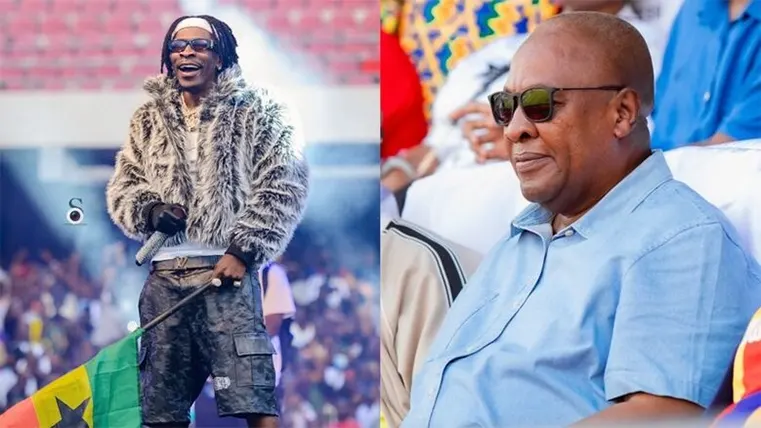The infectious rhythm of Shatta Wale’s “Mahama Paper” reverberated through the stadium during the electrifying 2025 President’s Cup clash between Ghana’s football titans, Accra Hearts of Oak and Asante Kotoko. President John Dramani Mahama, seated in the stands, was captured on video not just enjoying the music, but actively participating, singing along to the popular tune. This seemingly spontaneous act of musical appreciation transcended mere entertainment, morphing into a powerful symbol of connection between the president and the populace. The video, shared on TV3’s Instagram platform, quickly became a viral sensation, garnering thousands of likes and comments, sparking a wave of online discussions about President Mahama’s charisma and the unifying power of music.
The video clip itself captures a moment of unguarded joy. President Mahama, seemingly caught up in the infectious energy of the song, can be seen mouthing the lyrics: “You know say I no go fi take another… Mahama paper, paper, paper… Ooh yeeh, Franklin paper, paper, paper Isha Allah oo, Isha Allah oo, Isha Allah oo.” His evident enjoyment of the music resonated deeply with many viewers, prompting a flurry of positive comments. The scene transcended the typical formality associated with presidential appearances, presenting a more relaxed, human image of the leader, connecting with the public through a shared appreciation for popular culture.
The widespread circulation of the video sparked a range of reactions. Some viewed it as a shrewd political maneuver, a calculated attempt to appeal to younger demographics and leverage the popularity of Shatta Wale’s music for political gain. Others saw it as a genuine expression of enjoyment, a momentary escape from the pressures of office, a shared moment of musical camaraderie. Regardless of the varied interpretations, the video’s impact was undeniable, fueling discussions and debates across social media platforms, reinforcing President Mahama’s presence in the public consciousness.
The comments section below the video provided a fascinating glimpse into public sentiment. Many expressed admiration for President Mahama, praising his charisma and leadership. Comments like, “Personally, I don’t think you can force anyone into liking Mahama. The aura will always attract you to liking him,” and even from non-Ghanaians like, “The way I like this man ehhh, I am not even Ghanaian. Great president. May your tenure bring prosperity to Ghana and Africa,” suggest a deep wellspring of positive sentiment towards the president. These comments underscore the power of such seemingly unscripted moments to shape public perception and foster a sense of connection with leadership.
Another intriguing aspect of the online response was the acknowledgement of President Mahama’s familiarity with the song’s lyrics. Comments like, “Chairman dey sing every line ooo, Mr. President: Much respect,” highlight this observation, further contributing to the perception of his relatability and connection to popular culture. This resonates with the idea of a leader who is in touch with the people, aware of and appreciative of their cultural expressions. It reinforces the image of a president who is not distant and aloof but actively engaged with the heartbeat of the nation.
The “Mahama Paper” incident stands as a compelling example of the intersection of politics, music, and social media in the modern era. It demonstrates the potential for seemingly spontaneous moments to be amplified and disseminated across vast networks, shaping public discourse and influencing perceptions of political figures. Whether a calculated move or a genuine expression of musical appreciation, President Mahama’s engagement with Shatta Wale’s music struck a chord with many, underscoring the enduring power of music to connect, unite, and even influence the political landscape. The incident also highlights the increasingly blurred lines between public and private personas in the age of social media, where every captured moment has the potential to become a public spectacle, open to interpretation and debate.


